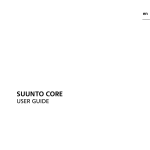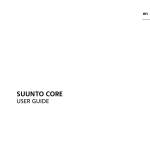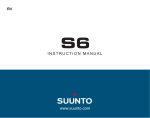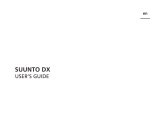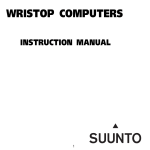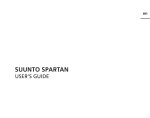Download Suunto LUMI Watch User Manual
Transcript
en USER GUIDE MODES AND VIEWS MENU CONTENT storm alarm SYMBOLS ON THE DISPLAY 1 Welcome . . . . . . . . . . . . . . . . . . . . . . . . . . . . . . . . . . . . . . . . . . . . . . . . . . . . . . . . . . . . . . . . . . . . . . 5 2 Introduction . . . . . . . . . . . . . . . . . . . . . . . . . . . . . . . . . . . . . . . . . . . . . . . . . . . . . . . . . . . . . . . . . . 6 3 Changing strap length . . . . . . . . . . . . . . . . . . . . . . . . . . . . . . . . . . . . . . . . . . . . . . . . . . . . . . . 7 4 General settings . . . . . . . . . . . . . . . . . . . . . . . . . . . . . . . . . . . . . . . . . . . . . . . . . . . . . . . . . . . . . . 9 4.1 Button tones . . . . . . . . . . . . . . . . . . . . . . . . . . . . . . . . . . . . . . . . . . . . . . . . . . . . . . 9 4.2 Tone guides . . . . . . . . . . . . . . . . . . . . . . . . . . . . . . . . . . . . . . . . . . . . . . . . . . . . . . . 9 4.3 Units . . . . . . . . . . . . . . . . . . . . . . . . . . . . . . . . . . . . . . . . . . . . . . . . . . . . . . . . . . . . . . 10 4.4 Language . . . . . . . . . . . . . . . . . . . . . . . . . . . . . . . . . . . . . . . . . . . . . . . . . . . . . . . . 10 4.5 Backlight . . . . . . . . . . . . . . . . . . . . . . . . . . . . . . . . . . . . . . . . . . . . . . . . . . . . . . . . . 10 4.6 Activating button lock . . . . . . . . . . . . . . . . . . . . . . . . . . . . . . . . . . . . . . . . . . . 11 5 Using TIME mode ...................................................... 5.1 Introduction . . . . . . . . . . . . . . . . . . . . . . . . . . . . . . . . . . . . . . . . . . . . . . . . . . . . . . 5.2 Changing TIME mode settings . . . . . . . . . . . . . . . . . . . . . . . . . . . . . . . . . . 5.2.1 Setting time . . . . . . . . . . . . . . . . . . . . . . . . . . . . . . . . . . . . . . . . . . . 5.2.2 Setting date . . . . . . . . . . . . . . . . . . . . . . . . . . . . . . . . . . . . . . . . . . . 5.2.3 Setting sunrise and sunset times . . . . . . . . . . . . . . . . . . . . 5.2.4 Setting dual time . . . . . . . . . . . . . . . . . . . . . . . . . . . . . . . . . . . . . 5.2.5 Using stopwatch . . . . . . . . . . . . . . . . . . . . . . . . . . . . . . . . . . . . . . 5.2.6 Using day counter . . . . . . . . . . . . . . . . . . . . . . . . . . . . . . . . . . . . 5.2.7 Setting alarm . . . . . . . . . . . . . . . . . . . . . . . . . . . . . . . . . . . . . . . . . 12 12 13 13 13 13 14 15 15 16 6 Using ALTI & BARO mode . . . . . . . . . . . . . . . . . . . . . . . . . . . . . . . . . . . . . . . . . . . . . 18 6.1 How ALTI & BARO works . . . . . . . . . . . . . . . . . . . . . . . . . . . . . . . . . . . . . . . . . 18 6.1.1 Matching profile to your activity . . . . . . . . . . . . . . . . . . . . . 18 2 6.1.2 Getting correct readings . . . . . . . . . . . . . . . . . . . . . . . . . . . . . 6.1.3 Getting incorrect readings . . . . . . . . . . . . . . . . . . . . . . . . . . . 6.2 Setting reference value and profiles . . . . . . . . . . . . . . . . . . . . . . . . . . . . 6.2.1 Setting altitude reference value . . . . . . . . . . . . . . . . . . . . . 6.2.2 Setting profiles . . . . . . . . . . . . . . . . . . . . . . . . . . . . . . . . . . . . . . . 6.3 Using weather trend indicator . . . . . . . . . . . . . . . . . . . . . . . . . . . . . . . . . . 6.4 Activating storm alarm . . . . . . . . . . . . . . . . . . . . . . . . . . . . . . . . . . . . . . . . . . 19 20 21 21 22 22 24 6.5 Using altimeter profile . . . . . . . . . . . . . . . . . . . . . . . . . . . . . . . . . . . . . 24 6.5.1 Using altitude difference measurer . . . . . . . . . . . . . . . . . . 25 6.5.2 Recording logs . . . . . . . . . . . . . . . . . . . . . . . . . . . . . . . . . . . . . . . . 26 6.6 Using barometer profile . . . . . . . . . . . . . . . . . . . . . . . . . . . . . . . . . . . 28 6.6.1 Recording logs . . . . . . . . . . . . . . . . . . . . . . . . . . . . . . . . . . . . . . . . 29 6.7 Using automatic profile . . . . . . . . . . . . . . . . . . . . . . . . . . . . . . . . . . . . 30 7 Using COMPASS mode ................................................ 7.1 How compass works . . . . . . . . . . . . . . . . . . . . . . . . . . . . . . . . . . . . . . . . . . . . . 7.2 Getting correct readings . . . . . . . . . . . . . . . . . . . . . . . . . . . . . . . . . . . . . . . . 7.2.1 Setting declination value . . . . . . . . . . . . . . . . . . . . . . . . . . . . . 7.3 Using compass . . . . . . . . . . . . . . . . . . . . . . . . . . . . . . . . . . . . . . . . . . . . . . . . . . . 31 31 31 33 33 8 Using memory . . . . . . . . . . . . . . . . . . . . . . . . . . . . . . . . . . . . . . . . . . . . . . . . . . . . . . . . . 35 8.1 Viewing logs . . . . . . . . . . . . . . . . . . . . . . . . . . . . . . . . . . . . . . . . . . . . . . . . . . . . . 35 8.2 Viewing and resetting log totals . . . . . . . . . . . . . . . . . . . . . . . . . . . . . . . . 35 3 en 9 Replacing battery . . . . . . . . . . . . . . . . . . . . . . . . . . . . . . . . . . . . . . . . . . . . . . . . . . . . . . . . . . . 10 Specifications . . . . . . . . . . . . . . . . . . . . . . . . . . . . . . . . . . . . . . . . . . . . . . . . . . . . . . . . . . . . . . 10.1 Technical data . . . . . . . . . . . . . . . . . . . . . . . . . . . . . . . . . . . . . . . . . . . . . . . . . . 10.2 Trademark . . . . . . . . . . . . . . . . . . . . . . . . . . . . . . . . . . . . . . . . . . . . . . . . . . . . . . 10.3 Copyright . . . . . . . . . . . . . . . . . . . . . . . . . . . . . . . . . . . . . . . . . . . . . . . . . . . . . . . 10.4 CE . . . . . . . . . . . . . . . . . . . . . . . . . . . . . . . . . . . . . . . . . . . . . . . . . . . . . . . . . . . . . . . 10.5 Patent notice . . . . . . . . . . . . . . . . . . . . . . . . . . . . . . . . . . . . . . . . . . . . . . . . . . . 10.6 Disposal of device . . . . . . . . . . . . . . . . . . . . . . . . . . . . . . . . . . . . . . . . . . . . . . Index . . . . . . . . . . . . . . . . . . . . . . . . . . . . . . . . . . . . . . . . . . . . . . . . . . . . . . . . . . . . . . . . . . . . . . . . . . 4 37 39 39 40 40 40 40 41 43 1 WELCOME en "For over 70 years Suunto has provided accurate, reliable information to people in need of it. Our instruments enable our users to reach their goals more effectively and get more out of their sports experience. Our products are often very critical to the user. Therefore we at Suunto take pride in maintaining highest quality standards for our products. " Founded in 1936, Suunto is the world leader in precision compasses, dive computers and wristop computers. Trusted by climbers, divers and explorers on every continent, Suunto Outdoor instruments deliver legendary design, accuracy and dependability. In 1987, Suunto pioneered the first dive computer, followed by the first ABC wristop in 1998. Offering the latest advancements in altimeter, sports fitness and GPS devices, Suunto remains the foremost choice of today’s outdoor professional. To learn more about Suunto Outdoor instruments and the people who use them, visit www.suunto.com. 5 2 INTRODUCTION We took you through the basic features and functions of your Suunto Lumi in the Quick Guide. Now you can start getting to really know how to use your new device. We will coach you through each process to help you get the most from your Suunto Lumi wristop. The wristop is not just for outdoor-related activities. You can be original and use it indoors as well – perhaps to navigate through a crowded department store! Enjoy your new Suunto Lumi! - the Suunto Lumi design team 6 3 CHANGING STRAP LENGTH en To change the strap length of your Suunto Lumi: 1. Use a pin, paper clip or other pointed tool to release the spring bar from the buckle. Remove the strap from the buckle and remove the spring bar from the strap. 2. Twist the measurement paper included in the package around your wrist so that the strap is comfortable (not too tight or loose). The number shown in the opening is the sum of lines, along which the straps need to be cut. For example 9 equals 5 + 4 pieces per strap. 3. Cut the needed amount of pieces along the cutting lines on the under side of the strap. 4. Insert the spring bars in the last spring holes of each strap. Push the spring bar into the buckle simultaneously pushing the moving part at the end so that it slides into place. The spring bar should lock into the buckle. 7 8 4 GENERAL SETTINGS en If you have not yet activated your Suunto Lumi wristop, please do so now! Just press any button, and then enter your personal preferences: language, measurement units, time and date. To change any settings, you need to enter MENU. To enter MENU, press [Mode] for 2 seconds - the MENU icon in the upper right corner will blink twice. Use [Up] or [Down Light] to scroll through the menu items until you reach GENERAL. Press [Mode] to enter GENERAL. Any changes you make in MENU will take effect immediately. Press [View] to return to the previous menu item. 4.1 Button tones Button tones can be turned either on or off. If you choose to turn button tones on, you will hear a beep whenever you press a button. In GENERAL, press [Mode] to enter BUTTON TONES. Press [Up] or [Down Light] to turn the button tones on or off. 4.2 Tone guides Tone guides can be turned either on or off. If you choose to turn tone guides on, you will hear a beep after you have made a setting or whenever your Suunto Lumi wants your attention. You will hear tone guides when you: ● change a setting value ● should set the altitude reference value ● start or stop the log recorder 9 ● start or stop measuring altitude difference ● start or stop the stopwatch ● are using AUTOMATIC profile and the device switches between ALTIMETER and BAROMETER profile. In GENERAL, press [Mode] to enter GUIDES. Press [Up] or [Down Light] to turn the tone guides on or off. 4.3 Units In GENERAL, press [Down Light] to reach and [Mode] to enter UNITS. You can choose either metric or imperial units for the following items: ● Air pressure: hPa or inHg ● Altitude: m or ft ● Temperature: °C or °F ● Date: dd.mm. or mm.dd. ● Time: 24 h or 12 h Press [Up] or [Down Light] to change the value. 4.4 Language Select a language for your Suunto Lumi. You can choose from 4 languages: English, French, Spanish and German. In GENERAL, press [Mode] to enter LANGUAGE. Press [Up] or [Down Light] to scroll through the language options. 4.5 Backlight You can activate the backlight in any mode by pressing [Down Light]. The backlight will automatically turn off after 5 seconds. To use the backlight while 10 in MENU, you will need to activate it in the TIME, ALTI & BARO or COMPASS mode before entering MENU. The backlight will then be activated until you exit MENU. NOTE: Heavy use of the backlight will significantly reduce battery life. 4.6 Activating button lock You can activate and deactivate the button lock by keeping [Down Light] pressed down. When the button lock is activated, it is indicated with a lock symbol . NOTE: You can change views and use the backlight when the button lock is activated. 11 en 5 USING TIME MODE 5.1 Introduction The TIME mode includes features related to time measurement. To access the TIME mode, press [Mode] until TIME is selected. By pressing [View], you can scroll through the various views within the TIME mode. There are 8 different views in the TIME mode: ● Empty: no supplementary information ● Weekday: displays the current day of the week ● Date: displays the current date ● Seconds: displays the seconds counter ● Dual time: displays the alternative time zone reading ● Sunrise and sunset: displays the sunrise and sunset times of a chosen location ● Stopwatch: can be used as a timer ● Day counter: countdown to/from a specified event The current time will always be displayed in the center. Only the view displayed below the current time will change. 12 5.2 Changing TIME mode settings en 5.2.1 Setting time You set the time in MENU. To enter MENU, press [Mode] for 2 seconds - the menu icon in the upper right corner will blink twice. In MENU, press [Down Light] to reach and [Mode] to enter TIME. Press [Down Light] again to reach and [Mode] to enter TIME. Change the hours, minutes and seconds by pressing [Up] or [Down Light]. 5.2.2 Setting date You set the date in MENU. To enter MENU, press [Mode] for 2 seconds - the menu icon in the upper right corner will blink twice. In MENU, press [Down Light] to reach and [Mode] to enter DATE. Press [Down Light] again to reach and [Mode] to enter DATE. Change the year, month and day by pressing [Up] or [Down Light]. 5.2.3 Setting sunrise and sunset times You can select a reference city for which you want to view the sunrise and sunset times. You set the sunrise and sunset times in MENU. To enter MENU, press [Mode] for 2 seconds - the menu icon in the upper right corner will blink twice. In MENU, press [Down Light] to reach and [Mode] to enter SUNRISE. You will need to input a general location, a region, as well as the nearest city. Press [Up] or [Down Light] to scroll through the choices. After you have set the information, your Suunto Lumi will automatically calculate both sunrise and sunset times. 13 NOTE: If you want to set the sunrise and sunset times for a location that is not listed in your device, select another reference city from the same time zone. Select the closest city north or south from your location according to the map. Handy tip: Setting sunrise and sunset times You’re on holiday in Toronto and you decide to take a walk. You want to know when the sun sets so that you get back to your hotel before it gets dark. You choose “Toronto” as your reference city. Your Suunto Lumi will then tell you when the sun sets! 5.2.4 Setting dual time Dual time is a nifty feature! If you want to follow the current time of two locations that so happen to have different time zones, then you can set one of those times as the dual time. You set the the dual time in MENU. To enter MENU, press [Mode] for 2 seconds - the menu icon in the upper right corner will blink twice. In MENU, press [Down Light] to reach and [Mode] to enter TIME. Press [Down Light] to reach and [Mode] to enter DUAL TIME. Change the time by pressing [Up] or [Down Light]. NOTE: We recommend that you always set the current time of your location as the primary time as the alarm clock will sound according to that time. Handy tip: Knowing the time at home You travel abroad and you want to know what time it is at home. You set the dual time as the time at home. Just check your dual time from the TIME mode and now you know what time it is at home, in case you want to telephone friends or family. 14 5.2.5 Using stopwatch You can use the stopwatch to measure time. It is ideal for timing your various sport activities! To use the stopwatch, go to the TIME mode. Use [View] to scroll through the various views until you see stopwatch. Use [Start Stop] to start and stop the stopwatch. To reset, press [Up] until the time is cleared. NOTE: Times recorded with the stopwatch are not stored into the memory. Handy tip: Measuring time You've moved to a new apartment. You want to know exactly how long it takes for you to walk to the bus stop so you won't be late for work the next day. You start the stopwatch and start walking to the bus stop. The result: 3 minutes and 40 seconds. Now you know what time you have to leave in the morning! 5.2.6 Using day counter The day counter is another one of our smart features! You can program any special day that you would like to remember, and the countdown to or from that event will start to scroll! You can countdown: your birthday, your anniversary, your better half’s birthday, (for our pregnant wearers) your due date, the day you begin your adventure, the day you have to go back to work after your incredible holiday ends and so on… You set the day counter in MENU. To enter MENU, press [Mode] for 2 seconds the menu icon in the upper right corner will blink twice. 15 en In MENU, press [Down Light] to reach and [Mode] to enter DATE. Press [Mode] to enter DAY COUNTER. Change the year, month and day by pressing [Up] or [Down Light]. 5.2.7 Setting alarm Your Suunto Lumi works as an alarm clock! You set the alarm in MENU. To enter MENU, press [Mode] for 2 seconds - the menu icon in the upper right corner will blink twice. In MENU, press [Down Light] to reach and [Mode] to enter TIME. Press [Mode] to enter ALARM. First switch the alarm on or off by using [Up] or [Down Light]. Press [Mode] and then set the alarm time by using [Up] or [Down Light]. Press [Mode] to confirm your settings. When the alarm is switched on, the symbol appears on the display. When the alarm sounds, you stop it by selecting NO. The alarm will sound the same time the following day. 24h 5min You can turn on the snooze function by selecting YES when the alarm sounds. The snooze function is also turned on if you don't select anything. The alarm will sound every 5 minutes until you select NO. You can snooze up to 12 times within 1 hour. 16 TIP: When the snooze is turned on, you can deactivate it in the TIME mode by keeping [View] pressed down. Handy tip: Waking up in the morning Your holiday starts tomorrow and you’re going on a long trip. You want to wake up early to make sure you have packed everything.You set your Suunto Lumi alarm for 6:30 and go to bed. The alarm wakes you up the next morning, but you feel like you need just a bit more sleep. So you choose YES when the device asks whether you want to snooze for another five minutes. The alarm goes off again. This time you get up and enthusiastically start preparing for your trip. What a difference those five minutes make! 17 en 6 USING ALTI & BARO MODE 6.1 How ALTI & BARO works The ALTI & BARO mode includes three different profiles: ALTIMETER, BAROMETER and AUTOMATIC. To access the ALTI & BARO mode, press [Mode] until ALTI & BARO is selected. By pressing [View], you can scroll through the various views within the ALTI & BARO mode. You can select a profile in MENU – see Section 6.2.2 Setting profiles on page 22 for more information! TIP: If you press [View] for 2 seconds in the ALTI & BARO, you will reach ALTI-BARO in MENU, where you can change your settings! 6.1.1 Matching profile to your activity What is the difference between profiles? An altimeter measures current altitude and is used for vertical movements. The altimeter is based on air pressure – so the lower your altitude then the more air above you. The ALTIMETER profile in 18 Suunto Lumi is combined with a memory that keeps track of your total and cumulative vertical ascents and descents. You can use the ALTIMETER profile while biking, hiking, skiing, snowboarding, climbing – basically for whatever outdoor activity including movement in altitude that you want to monitor! A barometer measures barometric air pressure when there is no increase or decrease in altitude. This is useful for weather forecasting. Low-pressure weather systems usually bring cloudy skies and precipitation (rain or snow), while high-pressure weather systems bring few clouds or precipitation. When the barometric pressure drops rapidly, there is a greater chance for bad weather. You can use the BAROMETER profile for any outdoor activity that does not involve changes in altitude (surfing, sailing, canoeing) – or if you just want to play meteorologist! To help you use the right mode in the right situation, we have designed the AUTOMATIC profile that automatically switches between the ALTIMETER and BAROMETER profile depending on your whereabouts. But, even if you use the AUTOMATIC profile, your Suunto Lumi will still prompt you when it switches from the ALTIMETER to the BAROMETER profile or vice versa. Handy, isn’t it?! 6.1.2 Getting correct readings Suunto Lumi measures the surrounding air pressure (absolute air pressure), which is affected by the altitude of the device and the weather. If you are engaged in an outdoor activity, you need to enter the altitude reference value for your location, which is found on most topographic maps. Your Suunto Lumi will now give you the correct readings. 19 en Absolute air pressure is measured constantly Absolute air pressure + Reference altitude = Sea level air pressure (BAROMETER profile) Absolute air pressure + Reference altitude = Altitude (ALTIMETER profile) Changes in local weather conditions will affect altitude readings. If local weather changes often, it is advisable to frequently reset the local reference altitude value, preferably before starting your journey and when an altitude reference value is available. If local weather is stable, the local altitude reference value can be set just once a day. 6.1.3 Getting incorrect readings ALTIMETER + standing still + weather change If you use the ALTIMETER profile for a longer period of time without any elevation change and the weather changes, then your Suunto Lumi reads the weather changes as altitude changes. ALTIMETER + altitude moving + weather change If the weather is frequently changing as you are either ascending or descending, your Suunto Lumi will give incorrect readings. BAROMETER + altitude moving If you use the BAROMETER profile for a longer period of time as you are either ascending or descending, your Suunto Lumi assumes you are standing still and reads your altitude changes as weather changes. 20 Handy tip: Setting altitude reference value You’re on the second day of your two-day hike. You realize that you forgot to switch from the BAROMETER profile to the ALTIMETER profile when you started out in the morning. So you hike to the nearest location shown on your topographic map for which a reference altitude value is provided. You set your Suunto Lumi altitude reference value accordingly. Your altitude readings are correct again. 6.2 Setting reference value and profiles 6.2.1 Setting altitude reference value It is really important to provide an accurate altitude reference value. The altitude reference is the exact altitude of where you are currently standing. You can find this measurement from any topographic map. The more often you insert an altitude reference value, the more precise the current reading will be as the air pressure usually changes depending on your location. Your Suunto Lumi will remind you to set the altitude reference value, if needed! You can set your altitude reference value in MENU. To enter MENU, press [Mode] for 2 seconds - the menu icon in the upper right corner will blink twice. 21 en In MENU, press [Down Light] to reach and [Mode] to enter ALTI-BARO. In ALTI-BARO, press [Mode] to enter REFERENCE. Change the value by pressing [Up] or [Down Light]. We would like to stress the importance of accuracy here. Try to find what your altitude reference value will be before heading out on your journey. All you need to do is input your altitude reference value, and Suunto Lumi will calculate the rest! Changes in weather conditions will affect your altitude readings. If the weather is variable, then you will need to frequently set a new reference value. If the weather is stable, then you need to set the value only once a day. 6.2.2 Setting profiles You set profiles in MENU. To enter MENU, press [Mode] for 2 seconds - the menu icon in the upper right corner will blink twice. In MENU, press [Down Light] to reach and [Mode] to enter ALTI-BARO. In ALTI-BARO, press [Down Light] to reach and [Mode] to enter PROFILE. You can choose from 3 profiles: ALTIMETER, BAROMETER or AUTOMATIC. Press [Up] or [Down Light] to scroll through the profiles. Press [Mode] to select the desired profile. It’s very important that you use the profile that directly relates to your activity in order to get an accurate reading! 6.3 Using weather trend indicator The weather trend indicator on the top of the display shows which way the air pressure has changed. The weather trend indicator is displayed in the ALTI & BARO mode. The arrow pointing right from center shows values 3 hours prior to the current value, and the line pointing left from center shows values 3 hours prior to that 22 value. So you have a good 6 hours of air pressure change values. This is a useful feature when you are planning to head out for a hike or when you need to look for shelter since it provides an indication of the weather conditions. Handy tip: Anticipating the weather You're on holiday and you want to anticipate tomorrow's weather, so you switch your Suunto Lumi to the BAROMETER profile for the night. In the morning, you check the weather trend indicator and note that the air pressure remained stable for the last six hours. Hopefully this will continue during the day! The weather trend indicator can indicate 9 different patterns in the barometric trend, for example: Situation 3-6 hours ago Situation last 3 hours Dropped heavy (>2 hPa/3hours) Dropping heavily (>2 hPa/3hours) Remained stable Rising heavily (>2 hPa/3hours) Rose heavy (>2 hPa/3hours) Dropping heavily (>2 hPa/3hours) 23 en TIP: If the weather trend indicator shows that the air pressure is constantly rising, there is a higher possibility of sunny weather upcoming. Again, if the air pressure is constantly dropping, there is a higher possibility of rainy weather. 6.4 Activating storm alarm The storm alarm notifies you with a warning alarm when there is a rapid fall of barometric pressure during a 3-hour period - so you better take cover since a storm is approaching! The storm alarm sounds and the alarm symbol flashes on the display for 20 seconds. The storm alarm only works when the BAROMETER profile is selected. You set the storm alarm in MENU. To enter MENU, press [Mode] for 2 seconds the menu icon in the upper right corner will blink twice. In MENU, press [Down Light] to reach and [Mode] to enter ALTI-BARO. In ALTI-BARO, press [Down Light] to reach and [Mode] to enter STORM. Press [Up] or [Down Light] to either turn on or off the storm alarm. Handy tip: Getting surprised by a storm while hiking You are on a two day hike and you are about to start your second day. The BAROMETER profile is on and the storm alarm suddenly goes off. The sky is getting dark. You take cover and postpone your hike for a few hours. 6.5 Using altimeter profile The ALTIMETER profile calculates your altitude based on the altitude reference value. 24 en There are 5 views within the ALTIMETER profile: ● Empty: no supplementary information ● Log recorder: allows you to record your activities ● Temperature: displays the current temperature ● Altitude difference measurer: measures the difference in your altitude ● Time: shows the current time By pressing [View] you are able to scroll through the views in the ALTI & BARO mode. Your current altitude will always be displayed. Only the view displayed below the current altitude will change. NOTE: If you are wearing your Suunto Lumi on your wrist, you will need to take it off in order to get an accurate temperature reading because your body temperature will affect the initial reading. Your Suunto Lumi will remind you to do this! 6.5.1 Using altitude difference measurer The altitude difference measurer feature is quite impressive! It is a quick-read measurement of your altitude difference starting from zero. It is handy when you want to know how much your altitude difference is for example during a climb. 25 You start the altitude difference measurer in the ALTI & BARO mode. Use [View] to select the altitude difference measurer. Press [Start Stop] as you begin a climb - your Suunto Lumi will do the math and calculate how high you climb. To stop measuring, press [Start Stop] again. To reset, press [Up] until the view is cleared. NOTE: You need to stop the altitude difference measurer in order to reset it! The altitude difference measurer is not dependent on your altitude reference value – and always works regardless of the values you have or have not input! You can also use it when the log recorder is on. Handy tip: Measuring your climbing You are about to start climbing a mountain that is 3280 feet (1000 m) high. You want to be able to check your progress as you climb, so you activate the altitude difference measurer. You start climbing, checking your altitude occasionally to see how far you are from the next check point. At some point you start to get tired. You check your altitude, and see that there’s still a lot of climbing ahead. Maybe you should replan the next check point! 6.5.2 Recording logs The log recorder is an interactive view which allows you to record your movements in altitude. You can view the recorded information at a later time. You start recording logs in the ALTI & BARO mode. Use [View] to select the log recorder view. Press [Start Stop] to start and stop the log recorder. A log symbol is displayed in all modes when the log recorder is on. To reset the log recorder, press [Up] until the view is cleared. 26 NOTE: You need to stop the log recorder in order to reset it! en NOTE: Your Suunto Lumi has the capacity to store up to 5 logs. When you start recording your 6th log, the first log erases from the memory while the second log moves up into that first spot. Each log can be recorded for a maximum of 33 hours. The altitude information is recorded every 30 seconds. While you are recording logs, your Suunto Lumi shows you additional views about your altitude change: altitude difference, ascent and descent. ● Altitude difference: indicates your altitude difference from when you started your log ● Ascent: indicates how much you have ascended from the log start ● Descent: indicates how much you have descended from the log start In the additional views: is displayed when your altitude is above the starting point. is displayed when your altitude is the same as at the starting point. is displayed when your altitude is below the starting point. is displayed when you view how much you have ascended from the log start. is displayed when you view how much you have descended from the log start. NOTE: These views are only displayed, when the log recorder is turned on. The view disappears after you reset the log recorder. 27 You can access your recorded log history and log details in MENU, see Section 8.1 Viewing logs on page 35. Handy tip: Recording altitude You’re going on a mountain hike. You want to record how much you ascend and descend to compare the figures with previous hikes. You set your Suunto Lumi to the ALTIMETER profile and start the log recorder when you begin the hike. After the hike, you stop your log recorder and reset it. Now you can compare it with your previous logs. 6.6 Using barometer profile The BAROMETER profile shows the sea level air pressure when there is no increase or decrease in altitude, for example when you go sailing. There are 4 views within the BAROMETER profile: ● Empty: no supplementary information ● Temperature: displays current temperature ● Log recorder: records your altitude changes in logs ● Time: displays the current time 28 By pressing [View], you are able to scroll through the views. The sea level air pressure will always be displayed in the center. Only the view displayed below the sea level air pressure will change. NOTE: If you are wearing your Suunto Lumi on your wrist, you will need to take it off in order to get an accurate temperature reading because your body temperature will affect the initial reading. Your Suunto Lumi will remind you to do this! Handy tip: Using the BAROMETER profile You’re hiking and you’re getting tired. You decide to take a nap and set up your tent. Since your altitude will stay the same, you activate the BAROMETER profile. When you wake up, you can check the changes in sea level air pressure. 6.6.1 Recording logs When you are using the log recorder in the ALTIMETER profile, you can switch to the BAROMETER profile for example when you take a break during your hike. The log recorder will continue recording the log, but the recorded altitude values will remain constant as you have switched to the BAROMETER profile. The device assumes you are standing still. For information on using the log recorder, see Section 6.5.2 Recording logs on page 26. NOTE: If you have started the log recorder in the ALTIMETER profile, you can stop it also in the BAROMETER profile. You can start the log recorder in barometer profile, but it will not record changes in altitude. 29 en 6.7 Using automatic profile The AUTOMATIC profile switches automatically between the ALTIMETER and BAROMETER profile according to your movements. The AUTOMATIC profile switches from ALTIMETER to BAROMETER profile when the device does not move in altitude for 12 minutes. When the device has moved 5 meters in altitude within 3 minutes, the automatic profile switches from BAROMETER to ALTIMETER profile. Depending on which profile is active, you can access the ALTIMETER or BAROMETER profile views by pressing [View]. 30 7 USING COMPASS MODE en 7.1 How compass works The compass allows you to orient yourself in relation to the magnetic North. There are three different views in the COMPASS mode: ● Empty: displays no supplementary information ● Heading: displays the numerical degree value of your heading ● Time: displays the current time 7.2 Getting correct readings To ensure correct compass readings while in COMPASS mode, you need to calibrate the compass correctly when prompted, set the correct declination value, keep the device level, and keep away from metal (for example, jewelry) and magnetic fields (for example, power lines). To calibrate the compass you need to keep the device level (do not tilt it in any directions), slowly rotate the device clockwise (around 15 seconds per round) until the compass is activated. The compass will switch itself to power saving mode after a minute. You can reactivate it by pressing [Start Stop]. NOTE: If the compass is not showing consistent values, you need to calibrate it. Keep the device level and rotate it slowly clockwise until the north indicator is stable again. This can take up to 3 rotations. 31 32 7.2.1 Setting declination value Declination is the angle between the true and magnetic North, and this function allows you to correct that difference. An interesting fact about declination is that the location of the magnetic North changes slightly every year. You can find the declination value from a map. For the most up-to-date value, do a search from the Internet (the National Geophysical Data Center in the United States supplies very accurate information). You can set the declination value in MENU. To enter MENU, press [Mode] for 2 seconds - the menu icon in the upper right corner will blink twice. In MENU, press [Down Light] to reach and [Mode] to enter COMPASS. You can set the declination to off or choose between East (E) or West (W) by pressing [Up] or [Down Light] and then [Mode]. Then set the declination value of your current location by pressing [Up] or [Down Light]. 7.3 Using compass The moving arrow segment on the outer rim of the display indicates the direction of North. Your own heading is at 12 o’clock and its cardinal point is 33 en shown in the center. When in the empty view, you will only see the cardinal point. When in the heading view, you will see the numerical degree value of your heading. Remember to keep your compass level, and keep away from metal (for example, jewelry) and magnetic fields (for example, power lines) to get correct readings. NOTE: The compass will switch itself to power saving mode after a minute. You can reactivate it by pressing [Start Stop]. 34 8 USING MEMORY en 8.1 Viewing logs You can view data for a specific log in MENU. To enter MENU, press [Mode] for 2 seconds - the menu icon in the upper right corner will blink twice. In MENU, press [Mode] to enter MEMORY. In MEMORY, press [Up] or [Down Light] to scroll through the log listings. Press [Mode] to view the chosen log. Press [Up] or [Down Light] to scroll through the data list. You can view the overall duration, the altitude graph and the highest and lowest point information. What’s neat about the altitude graph is that you are able to view that entire log with [Mode]! Use [Up] and [Down Light] to control the speed or direction of the scrolling graph. When you start to scroll, the corresponding time will be displayed below the scrolling graph. To stop scrolling, press [Mode]. NOTE: Your Suunto Lumi has the capacity to store up to 5 logs. When you start recording your 6th log, the first log erases from the memory while the second log moves up into that first spot. Each log can be recorded for a maximum of 33 hours. The altitude information is recorded every 30 seconds. 8.2 Viewing and resetting log totals Log totals is an interesting function because you can see the combined total of each and every log recorded since the last log totals reset. You can view the various cumulative totals for all of your logs in MENU. To enter MENU, press [Mode] for 2 seconds - the menu icon in the upper right corner will blink twice. 35 In MENU, press [Mode] to enter MEMORY. Then press [Mode] again to enter LOG TOTALS. Press [Mode] to enter VIEW and use [Up] and [Down Light] to scroll through the list. If you want to reset your log totals data, press [Down Light] to reach and [Mode] to enter RESET. Use [View] to store or [Down Light] to reset your log totals data. 36 9 REPLACING BATTERY en Your Suunto Lumi operates on a 3-volt lithium cell, type: CR 2032. NOTE: To reduce the risk of fire or burns, do not crush, puncture or dispose of used batteries in fire or water. Only replace them with manufacturer-specified batteries. Recycle or dispose of used batteries properly. Use a coin to open the battery compartment on the back of your device. First make sure that the O ring and all surfaces are clean and dry. Then remove the old battery. Place the new battery into the battery compartment with the positive side facing up. Slide the battery gently against the contact plate on the side, ensuring that it does not break or bend out of place. When you are replacing the cover, rotate it carefully counter-clockwise with your thumb in order to align the threads. The cover should rotate easily at first without having to use force. If you have to use force right at the start, the threads are misaligned and they may be damaged. Finally tighten the cover with a suitably sized coin. 37 NOTE: The markings on the cover may be left unaligned once the cover has been tightened. If the old cover is undamaged, it does not need to be replaced. NOTE: If the threads of the battery compartment cover are damaged, send your device to an authorized Suunto representative for service. NOTE: Replace the battery with extreme care to ensure that your Suunto Lumi remains water resistant. Careless battery replacement may void the warranty. NOTE: Heavy use of the backlight will significantly reduce battery life. 38 10 SPECIFICATIONS en 10.1 Technical data General ● ● ● ● ● Operating temperature -20 °C to +60 °C / -4°F to +140°F Storage temperature -30 °C to +60 °C / -22°F to +140°F Water-resistant 30 m / 100 ft (according to ISO 2281) Mineral glass User-replaceable battery CR2032 Altimeter ● Display range -500 m to 9000 m / -1640 ft to 32760 ft ● Resolution 1 m / 3 ft Barometer ● Display range 300 to 1100 hPa / 8.8 to 32.6 inHg ● Resolution 1 hPa / 0.03 inHg Thermometer ● Display range -20°C to 60°C / -4°F to 140°F ● Resolution 1°C / 1°F 39 10.2 Trademark Suunto, Wristop Computer, Suunto Lumi, their logos, and other Suunto brand trademarks and made names are registered or unregistered trademarks of Suunto Oy. All rights are reserved. 10.3 Copyright Copyright © Suunto Oy 2007. All rights reserved. This publication and its contents are proprietary to Suunto Oy and are intended solely for the use of its clients to obtain knowledge and key information regarding the operation of Suunto Lumi products. Its contents shall not be used or distributed for any other purpose and/or otherwise communicated, disclosed or reproduced without the prior written consent of Suunto Oy. While we have taken great care to ensure that information contained in this documentation is both comprehensive and accurate, no warranty of accuracy is expressed or implied. Its content is subject to change at any time without notice. The latest version of this documentation can always be downloaded at www.suunto.com. 10.4 CE The CE mark is used to mark conformity with the European Union EMC directives 2004/ 108/EY and 99/5/EEC. 10.5 Patent notice This product is protected by pending patent applications. 40 10.6 Disposal of device en Please dispose of the device in an appropriate way, treating it as electronic waste. Do not throw it in the garbage. If you wish, you may return the device to your nearest Suunto representative. 41 42 Index A B absolute air pressure, 20 accessing ALTI & BARO mode, 18 COMPASS mode, 31 TIME mode, 12 alarm, 16 ALTI & BARO mode accessing, 18 getting correct readings, 19 getting incorrect readings, 20 profiles, 18, 22 altimeter profile, 18 setting, 22 using, 24 views, 25 altitude difference measurer, 25 altitude reference value, 19 automatic profile, 19 setting, 22 using, 30 backlight, 10 barometer profile, 19 setting, 22 using, 28 views, 28 button tones, 9 C CE, 40 changing strap length, 7 compass using, 33 COMPASS mode accessing, 31 using, 31 views, 31 D date, 13 day counter, 15 declination, 33 disposal of device, 41 43 dual time, 14 altimeter, 18 automatic, 19 barometer, 19 G general settings button tones, 9 language, 10 tone guides, 9 units, 10 getting incorrect readings, 20 R recording logs, 26, 29 replacing battery, 37 S language, 10 log recorder using, 26, 29 views, 27 logs erasing, 35 viewing, 35 log totals resetting, 35 viewing, 35 sea level pressure, 19 setting alarm, 16 altitude reference value, 21 day counter, 15 declination value, 33 profiles, 22 storm alarm, 24 stopwatch, 15 storm alarm, 24 strap length, 7 sunrise and sunset, 13 M T magnetic North, 31 technical data, 39 temperature, 25, 28 time, 13 TIME mode accessing, 12 L P patent notice, 40 profile 44 setting date, 13 setting dual time, 14 setting sunrise and sunset, 13 setting time, 13 views, 12 tone guides, 9 trademark, 40 U units, 10 using altimeter profile, 24 automatic profile, 30 barometer profile, 28 compass, 33 V views altimeter profile, 25 barometer profile, 28 COMPASS mode, 31 log recorder, 27 TIME mode, 12 W weather trend indicator patterns, 23 using, 22 45 www.suunto.com Copyright © Suunto Oy 6/2007, 9/2007. All rights reserved.

















































